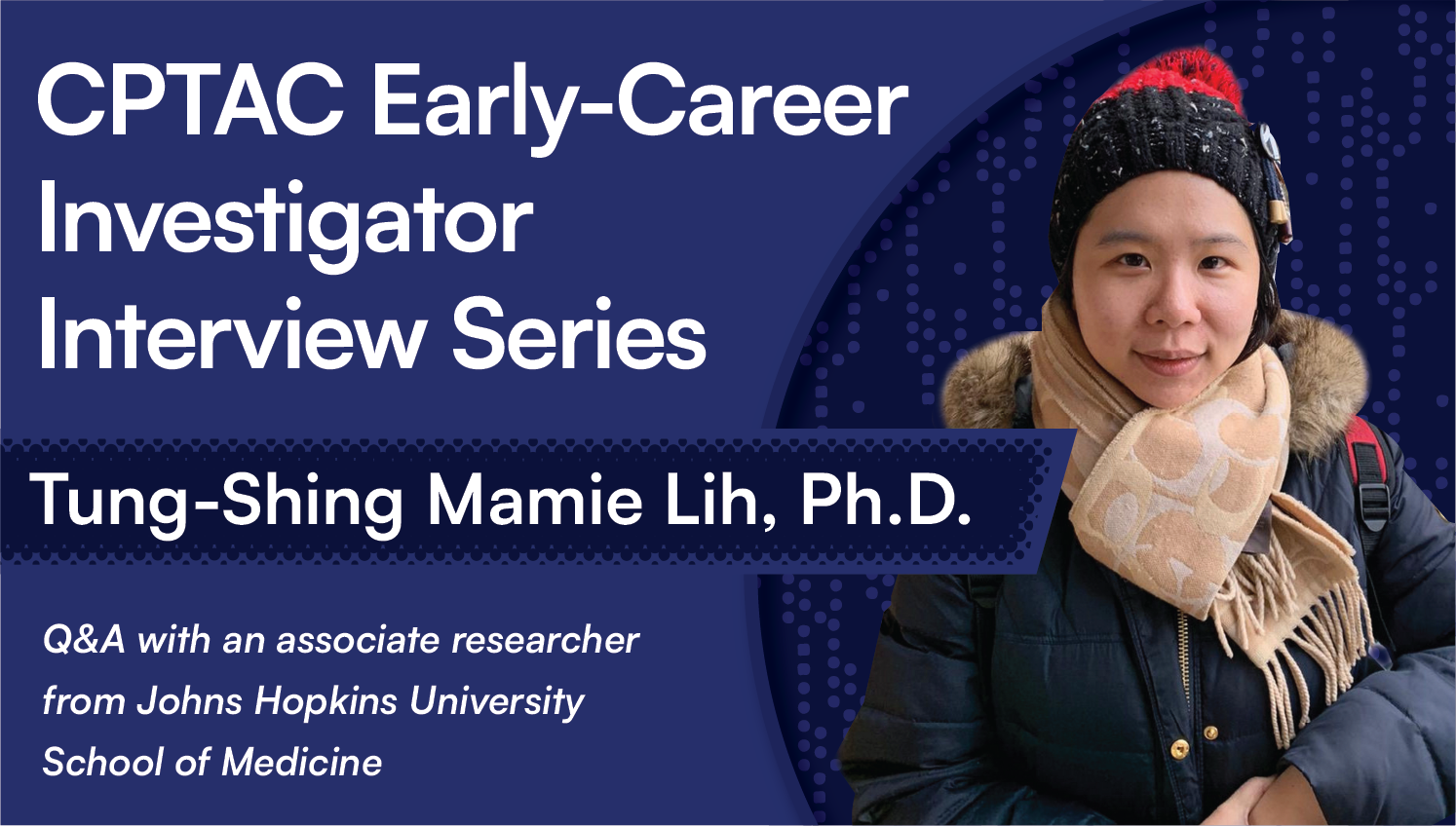The following is the fifth entry in a Q&A series highlighting selected Clinical Proteomic Tumor Analysis Consortium (CPTAC) researchers and their work. Join us as we discuss multiple facets of glycoproteomics research with Tung-Shing Mamie Lih, PhD, an associate researcher at Johns Hopkins University School of Medicine. Transcript is edited for clarity.

Q: Please describe your academic/professional journey to date.
ML: During my graduate study my main research project was to develop software for N-linked glycoprotein identification from mass spectrometry-based glycoproteomic data and I found myself really enjoying what I was doing. It was a fulfilling experience—I felt I was contributing to the development of a valuable tool. Then I started my postdoctoral position at Dr. Hui Zhang’s lab at Johns Hopkins University, where I continued to work on developing analysis platforms and software while also utilizing bioinformatics/biostatistics to study proteins and protein modifications in various cancer types. Lately I have started doing some benchwork, too. It's really satisfying to analyze the data I generated myself. I also believe that this hands-on experience with wet lab experiments will be helpful for developing software and analysis methods.
Q: Please describe your current work at Johns Hopkins. What do you find most compelling about this work?
ML: Currently I'm working as a research associate at Johns Hopkins University (JHU) and my research is still focusing on studying proteins and protein modifications. Recently I have led a complete study on the detection of pancreatic ductal adenocarcinoma (PDAC)-associated glycoproteins in serum which was published in Molecular Cellular Proteomics early this year. So, in this study we utilized both quantitative glycoproteomic and global proteomic approaches to detect glyco-features in serum with matched PDAC tissues from our previous flagship paper. I find this work compelling, primarily due to its potential clinical significance. The glyco-features that could be detected in both tissue and serum, suggesting a promising avenue for utilizing blood tests in the detection of PDAC. [At present] I'm also involved in the CPTAC gastric cancer project, for which I performed the randomization of samples for TMT labeling.
Q: Could you briefly describe your achievements in the clear cell renal cell carcinoma (ccRCC) research project?
ML: I joined Hui’s group in 2018, and since then I’ve been involved in three CPTAC ccRCC studies (2019, 2022, 2023). [The most recent of these] was a major accomplishment for me because in this study I analyzed the glycoproteomic data of the tissue cohort from the CPTAC ccRCC flagship paper. I think this study really demonstrates that glycoproteomics can expand our understanding of ccRCC by revealing previously uncaptured altered biological events. I also initiated an investigation of the interactions between N-linked glycosylation and phosphorylation [patterns] in ccRCC, which, to the best of my knowledge, had not been studied before.
Q: Could you describe the value of participating in collaborative groups like CPTAC?
ML: I think it's really nice to have these collaborations with researchers from different organizations. I think it [serves to] enhance the overall quality of the work. Engaging with professionals from different backgrounds is really significant in the whole research process and stimulates my creativity as well as my problem-solving skills. It's helped me produce research outcomes that are more impactful and more relevant because [in that environment] I am not expected to know everything; I can contribute my expertise and others can contribute theirs.
Q: What are some missing links you’ve identified in your field? How might these be overcome?
ML: I've done so many glycoproteomic analyses, and I think this type of data really does represent an important resource for understanding cancers. It allows people to investigate glycoproteins located on the cell surface and/or secreted from cells. However, causal effects represent [a gap in our understanding]-–[the result] of molecular alterations cannot really be determined based on the data that we have right now. I think that establishing these causal relationships would help researchers to understand the [downstream] consequences of specific actions or conditions.
Q: For aspiring individuals, what career advice would you offer, considering your own journey and experiences?
ML: So, most of my work is computational. I think for anyone, if they're really interested in doing this kind of work, I would recommend learning a programming language-- you just need to learn one [to start]. It would also be good to build a fundamental knowledge of statistics. Even when doing wet lab experiments it is good to have a background in statistics.
Ultimately, there is one quote that inspires me every day: “Every job is a self-portrait of the person who did it. Autograph your work with excellence”. I hope others might find that quote inspiring, too.

